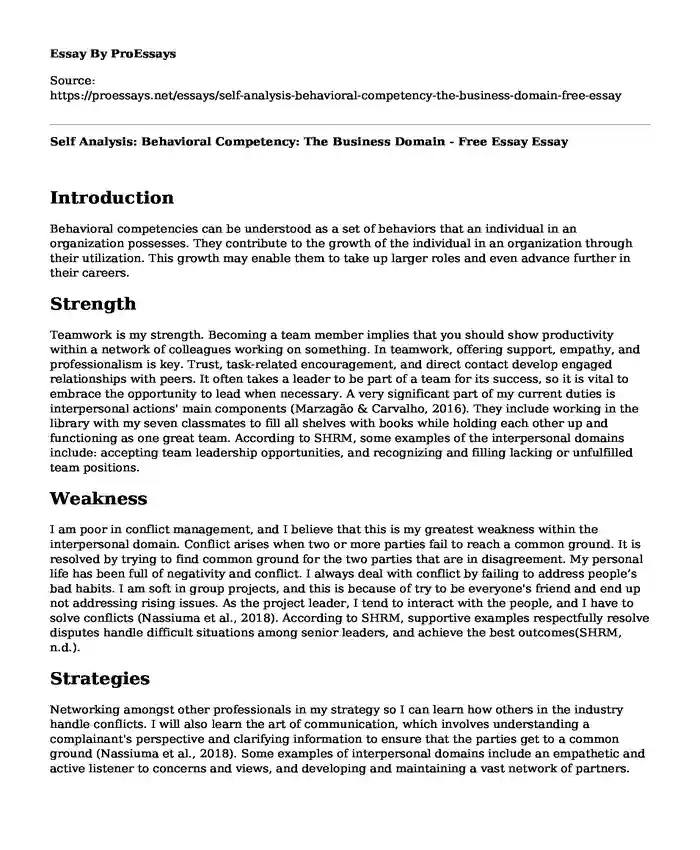Introduction
Behavioral competencies can be understood as a set of behaviors that an individual in an organization possesses. They contribute to the growth of the individual in an organization through their utilization. This growth may enable them to take up larger roles and even advance further in their careers.
Strength
Teamwork is my strength. Becoming a team member implies that you should show productivity within a network of colleagues working on something. In teamwork, offering support, empathy, and professionalism is key. Trust, task-related encouragement, and direct contact develop engaged relationships with peers. It often takes a leader to be part of a team for its success, so it is vital to embrace the opportunity to lead when necessary. A very significant part of my current duties is interpersonal actions' main components (Marzagão & Carvalho, 2016). They include working in the library with my seven classmates to fill all shelves with books while holding each other up and functioning as one great team. According to SHRM, some examples of the interpersonal domains include: accepting team leadership opportunities, and recognizing and filling lacking or unfulfilled team positions.
Weakness
I am poor in conflict management, and I believe that this is my greatest weakness within the interpersonal domain. Conflict arises when two or more parties fail to reach a common ground. It is resolved by trying to find common ground for the two parties that are in disagreement. My personal life has been full of negativity and conflict. I always deal with conflict by failing to address people’s bad habits. I am soft in group projects, and this is because of try to be everyone's friend and end up not addressing rising issues. As the project leader, I tend to interact with the people, and I have to solve conflicts (Nassiuma et al., 2018). According to SHRM, supportive examples respectfully resolve disputes handle difficult situations among senior leaders, and achieve the best outcomes(SHRM, n.d.).
Strategies
Networking amongst other professionals in my strategy so I can learn how others in the industry handle conflicts. I will also learn the art of communication, which involves understanding a complainant's perspective and clarifying information to ensure that the parties get to a common ground (Nassiuma et al., 2018). Some examples of interpersonal domains include an empathetic and active listener to concerns and views, and developing and maintaining a vast network of partners.
Conclusion
There is a need to improve some of my interpersonal domains. More studies will need to be done to find new means of fine-tuning my skills. This analysis helps one to better understand the problems one faces in a bid to change.
References
Marzagão, D. S. L., & Carvalho, M. M. (2016). The influence of project leaders' behavioral competencies on the performance of Six Sigma projects. Revista Brasileira de Gestão de Negócios, 18(62), 609. https://www.redalyc.org/pdf/947/94748013006_2.pdf
Nassiuma, B., Masasabi, J. M., Snelder, D., & Nangulu, A. (2018). Entrepreneurs experience and firm innovativeness: multiple mediations of attitudinal and behavioral competencies. Journal of Economics and Business, 1(1), 57-70. http://www.academia.edu/download/61994047/ed8b62_e14c32e8e30a4a9aa8d9d3c2249fef7d20200204-80628-1j7re1y.pdf
Cite this page
Self Analysis: Behavioral Competency: The Business Domain - Free Essay. (2023, Dec 29). Retrieved from https://proessays.net/essays/self-analysis-behavioral-competency-the-business-domain-free-essay
If you are the original author of this essay and no longer wish to have it published on the ProEssays website, please click below to request its removal:
- Does Oedipus Have Oedipus Complex? Psychology Essay Sample
- Essay Sample on Self-Management and Mindfulness
- The Effect of Maternal Stress on Prenatal Development - Research Paper
- Ethical and Moral Practices of Doing Business in Europe Paper Example
- Essay Sample on First-Time Crisis: A Journey of Saving a Life
- Essay on How Walt Disney Ruined Our Love Lives: The Impact on Modern Romantic Relationships
- West vs East: Understanding Facial Emotions in Social Contexts Essay







